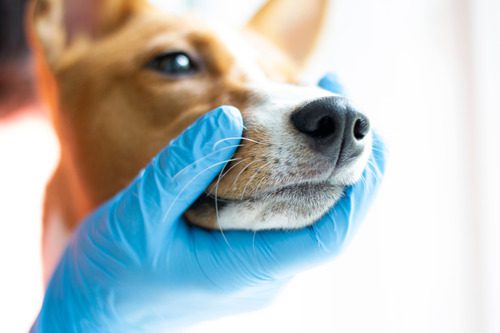Your dog’s wagging tail and excited grin are part of what makes them so lovable. But have you ever wondered about the health of their teeth? While their playful demeanor might not show it, dental health is essential for their overall well-being. Regular dog teeth cleaning helps prevent pain, discomfort, and potential health issues that could affect more than just their smile. In this blog, we’ll explore why dental care is crucial for dogs, what happens during professional cleanings, and how to recognize when your dog might need dental attention.

Why Is Dental Health Important for Dogs?
Just like humans, dogs can experience dental problems when their teeth are neglected. Plaque and tartar build-up not only cause bad breath but can lead to more severe health issues, such as gum disease, tooth decay, and infections. These problems can make eating painful for your dog, and the bacteria in their mouth can even spread to other parts of their body, affecting vital organs like the heart and kidneys.
Poor dental health can also impact your dog’s overall quality of life. Dogs use their mouths for much more than eating—they explore the world with their teeth and gums. Pain or discomfort caused by dental disease can discourage them from playing or eating properly, leading to other health complications. Investing in regular dog teeth cleaning not only improves your dog’s oral hygiene but also supports their happiness and longevity.
What Happens During A Professional Dental Cleaning Visit for My Dog?
Professional dog teeth cleaning is a thorough process designed to address dental issues that can’t be managed with at-home care alone. These cleanings are typically performed by veterinarians and include several steps to ensure your dog’s oral health is in top condition.
Examining the Teeth and Gums
Before the cleaning begins, your veterinarian will perform a comprehensive examination of your dog’s teeth and gums. This step helps identify any signs of gum disease, tooth decay, or other dental problems. If any serious issues are discovered, your veterinarian may recommend additional treatments or procedures.
Removing Plaque and Tartar
During the cleaning, plaque and tartar build-up are removed from your dog’s teeth using specialized tools. This process often involves scaling above and below the gumline to target areas where bacteria can hide. The removal of this build-up is essential to prevent gum disease and other complications.
Polishing and Fluoride Treatment
Once the teeth are clean, they are polished to smooth out the surfaces. This step reduces the risk of plaque accumulating on your dog’s teeth in the future. In many cases, a fluoride treatment is also applied to strengthen their enamel and protect against decay.
Signs Your Dog Needs Dental Attention
It’s not always easy to tell when your dog is experiencing dental problems, as they can be experts at hiding discomfort. However, there are several signs that may indicate it’s time for a professional dog teeth cleaning:
- Bad breath: Persistent bad breath can signal bacterial build-up or gum disease.
- Discolored teeth: Yellow or brown teeth are often covered in tartar and need cleaning.
- Bleeding gums: Blood on chew toys or in your dog’s mouth can indicate gingivitis or more advanced gum disease.
- Difficulty eating: If your dog avoids hard foods or chews on one side of their mouth, they may be experiencing tooth pain.
- Pawing at the mouth: Dogs with dental discomfort might paw at their face or mouth area.
If you notice any of these symptoms, schedule an appointment with your veterinarian. Ignoring these signs can allow dental problems to worsen, leading to more significant health risks over time.
What Are the Benefits of Regular Dog Teeth Cleaning?
Routine professional cleanings are a proactive way to maintain your dog’s dental health. Here are some of the top benefits:
- Prevents gum disease: Regular cleanings reduce plaque and tartar, lowering the risk of painful gum infections.
- Improves quality of life: Healthy teeth and gums allow your dog to eat, play, and interact comfortably.
- Reduces bad breath: Clean teeth mean fresher breath, making cuddles more enjoyable for both of you.
- Protects overall health: Oral bacteria can affect your dog’s heart, liver, and kidneys if left untreated.
- Saves money in the long run: Preventing advanced dental issues can help you avoid costly treatments later.
At-Home Dental Care Tips for Dogs
While professional cleanings are vital, at-home care plays a significant role in maintaining your dog’s oral health between vet visits. Here are some tips to keep their teeth in tip-top shape:
- Use dog-safe toothpaste and a soft-bristled toothbrush to clean your dog’s teeth. Aim for daily brushing or at least several times a week.
- Offer dental chews designed to reduce plaque and tartar build-up while keeping your dog entertained.
- Provide durable chew toys to help scrape away plaque as your dog chews.
- Use water additives to promote better oral hygiene.
- Schedule regular check-ups with your veterinarian to monitor your dog’s dental health.
Consistency is key when it comes to at-home dental care. A combination of professional cleanings and regular home maintenance is the best way to keep your dog’s teeth and gums healthy.
Is It Time to Schedule Your Dog’s Next Cleaning?
If you’re unsure about your dog’s current dental health, it’s always better to err on the side of caution. Regular dog teeth cleaning is an investment in your dog’s health and happiness. Your veterinarian can assess your dog’s teeth, recommend a cleaning schedule, and provide advice tailored to your pet’s specific needs. If you’re in Miami, FL, the team at Country Club Animal Hospital is here to help. Call us today at (305) 663-3300 or book an appointment online to schedule your dog’s dental check-up.
